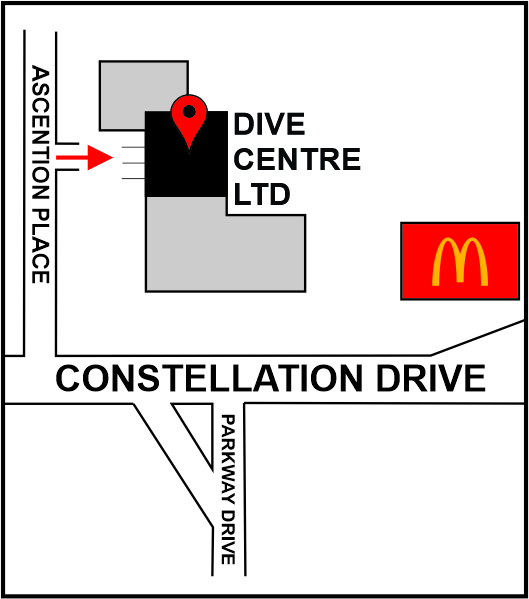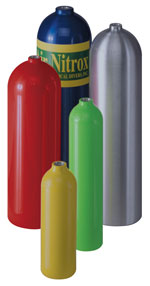
Stay informed of the latest news and specials.
1 Ascension Place, Rosedale, Auckland 0632
Deliveries to: 5/20 Constellation Drive,
Rosedale,
North Shore,
Auckland 0632
Ph: +64 9 444 7698

MANUFACTURER: Faber
CODE: 200008
PRICE:$549.00
Dimensions (with boot & valve) - 703mm tall - 178mm diameter
Weight Empty (with boot & valve) - 15.5kg
Weight Full - 18.5kg
Approved for Enriched Air up to 40%
All of our Dive cylinders come with a DIN Convertible valve (included in the price) that can be filled to max. 225 Bar as an "open face" valve but 232 Bar for Faber Stell cylinders when converted to DIN and used with a DIN Regulator.
All valves are stamped with your initials and cylinders come filled with neat sweet dry filtered Dive Centre Air! (Unless couriered to you directly, as they have to be empty but are assembled and ready to fill).
 Steel vs Aluminium is a question we're asked all the time, and it's a good one! There is no short answer and it is really dependant on several factors.
Steel vs Aluminium is a question we're asked all the time, and it's a good one! There is no short answer and it is really dependant on several factors.
1. Price - Usually there is quite a difference between Steel and Alluminium cylinders; this has been fixed by our current pricing as there is now very little difference, although at some other shops it is still significant.
2. The amount of air you actually need - The most popular steel cylinders are the big ones! The 15 litre holds around 30% more air, and is slightly shorter than the big aluminium. The 12 litre model holds 10% more air but it is also 10% lighter! The Dumpy 12 litre model is popular because it's much shorter so is easier to carry and store.
3. Air Consumption - If you are breathing through your cylinder faster than the buddies you are diving with, then the bigger steel cylinders are a great way to even up the game! If you go through your air at the same speed or slower than your buddies, it is a waste of time having more air, as you'll have to come up when your buddy does anyway! Stick with the same size cylinder that they use.
4. Warranty - You get a 10 year warranty from date of manufacture with Catalina Aluminium cylinders, and a 5 year warranty with Faber Steel.
5. Buoyancy - All cylinders get lighter as they empty, however there is a difference between steel and aluminium. Luxfer Aluminium cylinders will become positively buoyant when low on air, Faber steel and Catalina Alluminium cylinders are still slightly negatively buoyant when low on air. This means you don't have to wear extra lead to counteract that buoyancy at the end of the dive, and a lighter weightbelt is a good thing!
6. Corrosion - Faber steel cylinders are Zinc coated on the inside and under the paintwork on the outside, to try and stop rust, but scratches and Hydrostatic test marks will rust eventually. And if you get a fill with to much moisture or accidently "fully" empty your cylinder, it could start rusting inside! Not good!! (Ensure you only get fills from a reputable air source). Click here to see the "peace of mind" you get with Dive Centre Air! Aluminium cylinders don't rust, so from a maintainence issue, you don't have to repaint or rub down alluminium cylinders, and although it is recommended for aluminium, washing down steel cylinders after use is HIGHLY recommended! You can get a build up of aluminium oxide (white powder) inside aluminium cylinders from to much moisture in bad air, and over time this can cause pitting which will cause your cylinder to be condemned. A steel cylinder with rust inside will end the same way so clean air and never emptying your cylinder are both important!
As you can see, there is a bit to this decision. :-)
But once you own your own cylinders, going for a dive is so much more convenient, because there they are, sitting in your garage, full of air, ready to go!
All prices include GST, Valve & first fill, but prices, availability and details are subject to change without notice. Please call us on 09 444 7698 oremail us now, to confirm availability and details.
| Cylinder - Pick up Instore | $0.00 | |
| Each Cylinder Delivery Auckland | $9.00 | |
| Each Cylinder Delivery North Island | $30.00 | |
| Each Cylinder Delivery South Island | $55.00 | |
| Each Cylinder Delivery Rural North Island | $45.00 | |
| Each Cylinder Delivery Rural South Island | $65.00 |
All details, prices and availability are subject to change - All rights reserved Dive Centre Ltd 1972-2025